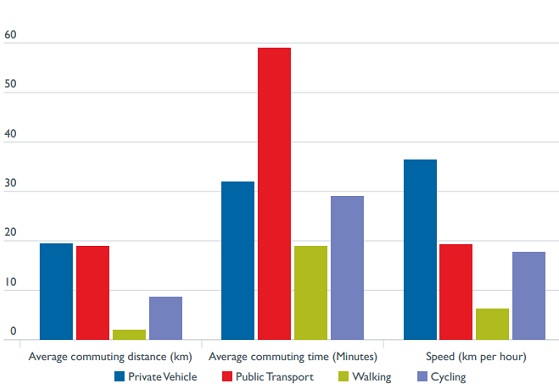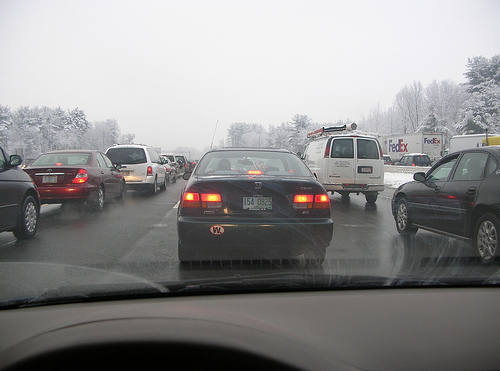Commuting: just how wasteful is it really?
Does that old axiom, “It’s the journey, not the destination, that matters” apply to the topic of commuting? For many, posits Crikey, an Australian alternative news site, the tired cliche still rings true. Despite the bad rap commuting gets – common complaints that spring to mind are gridlocked traffic; road rage-suffering drivers; overstuffed subways… and the list goes on – there is tangible social value to the necessary practice.
To fully assess the consequences of commute times, Crikey says, we need to consider the jobs that commuters are going to, the technology they have access to on their trip, and what commuters might spend their time on instead.

Commute times, distances and speeds in Melbourne, Australia. From Crikey’s blog, The Urbanist.
Fascinating (well, to some of us) U.S. Census data reveals that 45% of one-way commutes in metropolitan areas require less than 20 minutes. And just 8% of commutes take longer than 60 minutes. As much as commuting horror stories are fun to share at the water cooler — many like to groan about the hassles of getting to work, it seems — the amount of time spent doing so isn’t as justifiably gripe-worthy as one might assume. In fact, one U.C. Davis study even found that a select few (7%, to be precise) want their commutes to be even longer.
The benefits of a commute are varied: Smartphones and e-book readers allow commuters (especially non drivers) to catch up on work and reading, play games, and access social media (perhaps so that they can post status updates about said commute). The existence of a commute in the first place indicates that the commuter has a job — which brings in money and increases earning power, productivity, and, of course, happiness.

Care for some snow with a side of traffic jam? Some of our commutes are less pleasant (and less productive) than others. From Brian Sawyer.
What about those especially long commutes? One recently released study suggests that the longer the time spent commuting, the more likely commuters are to have marital problems. “New work from researcher Erika Sandow of Umea University in Sweden,” reports The Atlantic, “found that couples with longer commutes are more likely to break up than those without them.”
While the study focused on long-distance commutes — a 45-minute-plus commute is considered the baseline for a “long” commute — it specified that the “social costs of long-distance commuting… reduce the quality of a relationship in many ways and thus increase the risk of separation.” Commuting isn’t a make-or-break issue for relationships; but, simply put, “If you’re the type of person whose long commute bothers you in the first place, there’s a good chance it will end up bothering your relationship, too.”
Still, the study may not bode well for New Yorkers. Another recently released report conducted by the nonprofit Partnership for New York City found that New Yorkers enjoy (or loathe, depending on who you ask) the longest commute in the nation. At 48 minutes, it’s about 13 minutes longer than the nation’s average commute length.
Manhattan, which boasts 1.5 million commuters daily, hosts 364,000 people coming from out of state to work in the city. As one commuter griped to the New York Daily News, “Three trains, commuting two hours — it’s a hassle!” We venture that it’s up to the commuter: whether you kill time or capitalize on it, the commute isn’t going (figuratively speaking, of course) anywhere.

As New Yorkers can attest, plentiful public transport may make your commute cheaper, but it doesn’t necessarily make it any shorter. From specialoperations.
Category: Automotive, Infrastructure













